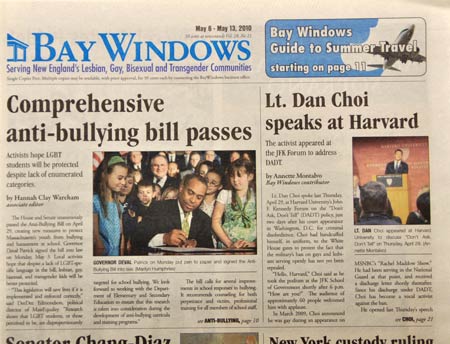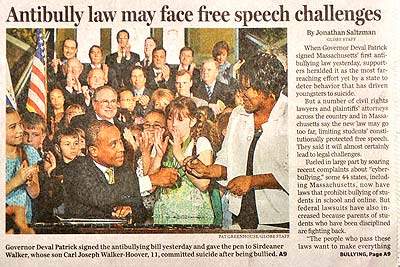 |
 |
Pro-family activism that makes a difference! | ||||
Gov. signs "anti-bullying" bill, most comprehensive in America. Opens door to more gay activism in schools.
POSTED: May 19, 2010On May 3, after months of media-induced hysteria and special-interest group pressure, Mass. Gov. Deval Patrick signed the "anti-bullying bill" into law. A few days before, it was passed unanimously by the House and Senate. After it passed it was applaluded by homosexual groups and liberal politicians, attacked by civil libertarians, and criticized in a Boston Globe article saying it would be ineffective according to recent research. The new law affects both public and private schools, and includes a long list of onerous, controversial, and expensive mandates. "It will be the strongest anti-bullying legislation in the country," bragged Rep. Martha Walz (D-Boston), chairman of the Education Committee and a staunch pro-gay liberal. Bill's passage cheered by homosexual activistsThe passage of the bill was cheered by homosexual activists across Massachusetts. From the beginning the homosexual movement was the driving force behind it. Many of the law's requirements open the door for more homosexual activism in the schools even beyond the control of school administrators.
DeeDee Edmondson, political director of MassEquality told the homosexual newspaper Bay Windows: "Research shows that LGBT students, or those perceived to be, are disproportionately targeted for school bullying. We look forward to working with the Department of Elementary and Secondary Education to ensure that this research is taken into consideration during the development of anti-bullying curricula and training programs." Of course, the "research" she was referring to was GLSEN's absurd "school climate survey" and the discredited "Youth Risk Behavior Survey", both of which homosexual activists use to "prove" that homosexual programs are needed in schools. GLSEN (the Gay Lesbian and Straight Education Network), a well-funded national homosexual group targeting schoolchildren founded by Kevin Jennings, has been a major player in "anti-bullying" legislation across the country. Also publicly cheering the passage of the bill in various Boston media were the leaders of PFLAG (which also pushes homosexual programs in schools), GLSEN-Boston, and the Massachusetts Gay and Lesbian Political Caucus. At center stage during the entire campaign was Sirdeaner Walker, mother of a boy who tragically killed himself. Walker is now a member of GLSEN's national Board of Directors and has been traveling across the country pushing the GLSEN model of anti-bullying legislation, which Massachusetts largely modeled this legislation on. Patterned after GLSEN's model languageMassachusetts homosexual lobby worked hard in the background -- from the drafting of the original bills, through the public hearing, the PR campaign, and the re-drafts of the bill. As a result, the law is loosely patterned after GLSEN's "Model State Anti-Bullying and Harassment Legislation." It also includes language similar to GLSEN's "Model school anti-bullying and harassment policy" and GLSEN's guidelines for schools. These were designed with GLSEN's goals in mind: to use anti-bullying legislation as an entrée for enforcing the homosexual agenda in schools. It's very clear that whoever wrote the Massachusetts bill relied on these documents. Interestingly, the one thing the homosexual activists wanted most - specific enumerated categories of "protected" classes (i.e., "GLBT" students) - was not included. We suspect that was to deflect attacks on the bill during passage. But they did leave a door open for that. Some of the highlights of the bill include:
Attacked by ACLU and civil libertariansAlmost immediately, civil libertarians, citing cases around the country against similar legislation, attacked the new law. [S]ome aspects of the law are so general that civil rights lawyers are concerned about how schools will apply it. The law, for example, defines one form of bullying as "repeated use'' of a written, verbal, or physical act that "causes physical or emotional harm to the victim.''
Law will fail to be effective, says research in Boston GlobeTwo days after the House and Senate unanimously passed it, the Boston Globe's Sunday Magazine published an article that was a scathing indictment of the approach just passed by the politicians. There's been lots of talk lately about anti-bullying programs. How could there not be, after all the horrifying details that emerged following the suicide of South Hadley teenager Phoebe Prince. And there will be lots more talk now that the Massachusetts Legislature has approved a bullying bill requiring schools to implement prevention and intervention programs. The available programs vary widely, as do the people behind them, who range from self-promoting, self-proclaimed experts, offering little more than buzzwords, bromides, and books for sale, to thoughtful, committed educators determined to do the hard work to protect other kids like Phoebe. But here's what has gotten lost amid all the legislation and finger-pointing: None of the current anti-bullying programs, despite their fanfare, have been successful in reducing actual bullying among American students in any meaningful way. The article goes on to discuss a bystander or "sidekick" intervention strategy being explored by some researchers, but they admit that there's "not a lot of science" to back that approach but it's being explored because "the anti-bullying programs now in circulation have thoroughly failed to move the meter." 
Why did the Boston Globe wait until the bill was already passed to run this story? Maybe because they already had a tremendous amount of energy and ideology already invested in its passage. Why did the legislature pass this?In our estimation the unanimous passage of this very questionable and rightly controversial law (which is so transparently connected to the homosexual lobby) represented a complete triumph of hysteria and cowardice over principle and common sense. We and many others did our best to educate as many representatives and senators as possible. They simply didn't want to listen and they clearly didn't care. It was almost comical. They were all worried about bad press in the liberal media they didn't go along. Even all the "good" legislators on Beacon Hill followed this in lockstep - which should tell you by now that there are actually no "good" legislators left. We could name names, but why bother? It's a truly pathetic situation. And now the state's schools are left with this expensive albatross that by all recent estimates won't even work. |
| Top |

